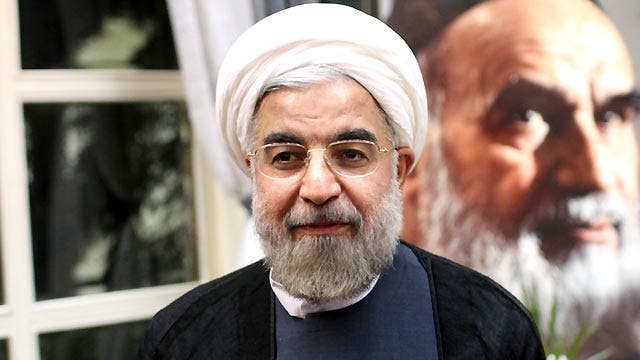This is a rush transcript from "Special Report," June 18, 2013. This copy may not be in its final form and may be updated.
(BEGIN VIDEO CLIP)
PRESIDENT BARACK OBAMA: Express cautious optimism that with a new election there, we may be able to move forward on a dialogue that allows to us resolve the problems with Iran's nuclear program.
HASAN ROWHANI, IRAN PRESIDENT-ELECT: Of course our nuclear programs are totally transparent in nature, but we are ready to show more transparency and to show the world that Iran's nuclear work complies fully with the international framework.
(END VIDEO CLIP)
BRET BAIER, ANCHOR: Well, to hear the president and the administration talk about the Iran election and the new President-elect Hasan Rowhani, there is optimism for a negotiation on nuclear weapons programs – or nuclear program in Iran. However, experts say he is really a regime insider close to the ayatollah, the supreme leader.
And here is a quote from 2004. Rowhani in 2004 speech said to Iran's Supreme Cultural Revolution Council "If one day we are able to complete the fuel cycle and the world sees that it has no choice -- that we do possess the technology -- then the situation will be different. The world did not want Pakistan to have an atomic bomb or Brazil to have the fuel cycle. But Pakistan built its bomb and Brazil has its fuel cycle, and the world started to work with them. Our problem is that we have not achieved either one, but we are standing at the threshold."
With that we're back with the panel. Charles, your thoughts?
CHARLES KRAUTHAMMER, SYNDICATED COLUMNIST: Look, the search for Iranian moderates is perpetual. And the answer is always the same -- it's a mirage. We go back to the hostage crisis in '79. We were looking for the moderates. Then Iran-Contra started because the national security advisor of Ronald Reagan of all people had had the idea that he knew of some moderates in Iran and he went over on a secret trip. In the end he was swindled and humiliated.
But this happens over and over again. This is a wish. It's not a reality. This is a guy, incidentally, who in 1999 was the man who spearheaded the crackdown on the student uprising which was absolutely ruthless. He is not a moderate. He is not a democrat.
And on the issue of nuclear negotiations, in which he was heavily involved, he boasted about the fact that as he negotiated they never stopped enriching uranium, which was the one demand of the West. And as you indicated in that quote, there is not an iota of difference between him and the ayatollah, who essential is the guy who runs Iran in any case, on the three important issues that we care about -- Iran being nuclear, supporting Assad in Syria, and ultimately destroying Israel, our chief ally in the region.
BAIER: Mara, it's important to point out that the candidates are all given the nod by the ayatollah, the supreme leader.
MARA LIASSON, NATIONAL PUBLIC RADIO: This is kind of bizarre mix of a theocratic dictatorship with some local elections. And there was an election, but they were eight handpicked candidates. A lot of real reformers were kicked off the ballot. And is he a former member of the regime. And foreign policy is controlled by the supreme leader anyway.
But if the sanctions, which we are told are really taking a bite in Iran, if that is something that's really going to work, you want to be at least negotiating with someone who is more reasonable. But they have to have a real interest to do this. He is not going to do this because he's a good guy or a reformer.
BAIER: Is the administration grasping for that moderate who's not there?
STEVE HAYES, SENIOR WRITER, THE WEEKLY STANDARD: Yes. They have been doing this for four years. Look back what the president said in his inaugural address. He has been shot down every time he has tried to extend the hand of peace to Iran. This changes nothing.
The Mullahs are in control. Rowhani -- he's not going to change anything of substance. This boast that Charles alluded to briefly wasn't something that he said in 2007 or 2009. It's something he said three weeks ago in an appearance on Iranian state television when he was challenged. He said, basically, you were soft with the West; you were soft with the Americans. He said no, I wasn't. We didn't suspend our program. We completed our program. So three weeks ago, he is bragging about having completed the nuclear program while he was delaying the West, and now we are looking at him as some sort of great hope?
BAIER: Quickly, does this change the dynamic of what's happening with the negotiations at all?
LIASSON: I don't think so.
KRAUTHAMMER: It doesn't, but Obama will take the bait and we're going to lose six months or more in useless negotiations, six months in which they are going to continue enriching uranium and getting near to a bomb.
BAIER: Does it change Israel's timeline?
KRAUTHAMMER: It probably will make Israel less likely to rely on the West, which it was hoping would at some point get serious. The resumption of negotiations would be a declaration of un-seriousness.
BAIER: That is it for the panel. But stay tuned for a very determined high school graduate.
Content and Programming Copyright 2013 Fox News Network, LLC. ALL RIGHTS RESERVED. Copyright 2013 CQ-Roll Call, Inc. All materials herein are protected by United States copyright law and may not be reproduced, distributed, transmitted, displayed, published or broadcast without the prior written permission of CQ-Roll Call. You may not alter or remove any trademark, copyright or other notice from copies of the content.






















